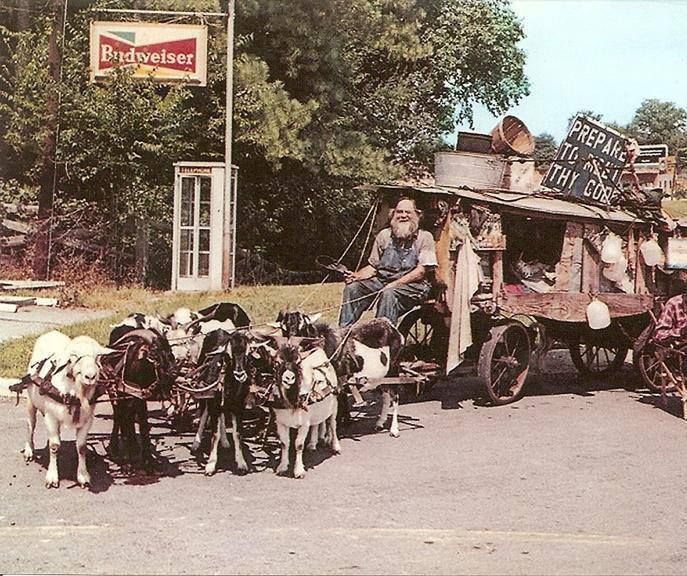It would usually happen in the late summer or early fall. The warm weather meant that the children of East Tennessee were usually still barefoot and school had not begun.
Normally, news traveled through word of mouth or possibly a telephone conversation, but when the Goat Man made his yearly pilgrimage through the Concord/Farragut community, one needed only to sniff the air to know he was in the vicinity.

A mystery solved – or not. (Photo from www.findagrave.com)
Charles “Ches” McCartney was an itinerant preacher who traveled in a makeshift wagon that was pulled by sometimes as many as 30 goats. And since he slept with his goats and seldom took a bath, he was known as “The Goat Man.”
The wagon itself was a sight to behold. It was piled high with a variety of things he had found along the road during his travels, and it contained a potbelly stove and an assortment of pots and pans. One wondered how it managed to stay together in one piece and not leave a trail of junk behind.
When word spread that the Goat Man was traveling through, many would gather, mostly out of curiosity. He usually stopped at the edge of Knox County, close to the Dixie Lee Junction, and would build a bonfire about dusk. Children stood and gazed at him in amazement while the adults engaged in interesting conversations. He would share his lifetime testimony and proceed to preach of the imminent second coming and warnings of everlasting doom for sinners.
Sitting beside the fire, the Goat Man would begin by sharing a story of his life and how he ran away from his family farm in Iowa at the age of 14, marrying a knife thrower who was 10 years older than he. They tried making a living at farming. When he told her of his dream of traveling with a herd of goats she, then pregnant, ran away. He was married at least two more times.
McCartney’s faith was made stronger when he was working at the Works Progress Administration (WPA) cutting trees and a tree fell on him. He was pronounced dead and awoke on the embalmer’s table.
When asked how he managed to make a living, he would say, “I’m glad you asked,” and produce a stack of postcards picturing him and his wagon. He sold the postcards and scrap metal he had found along the road and never turned down any donations. His diet consisted of a few items of food he was able to buy and, of course, goat milk.
The day after McCartney had left the area, it wasn’t uncommon for someone to spot the Goat Man’s farewell message: a sign somewhere along the road that simply read “Prepare To Meet Thy God.”
Rumors were that he was rich, and as he grew older he became the target of several muggings. This led to his retirement after traveling over 100,000 miles preaching from 1930 to 1987.
He lived out his last years with his son, living together in an old school bus in Georgia. He died in a nursing home in Macon, Ga., in 1998 at the estimated age of 97. But true to his character, he claimed to be 106.
Those who witnessed this traveling folk character will never forget him. And to make sure future generations would know of him, Cormac McCarthy featured the Goat Man in his 1979 novel “Suttree,” set in Knoxville. If he were alive today, McCartney would still be giving his sage advice: “Prepare To Meet Thy God.”

